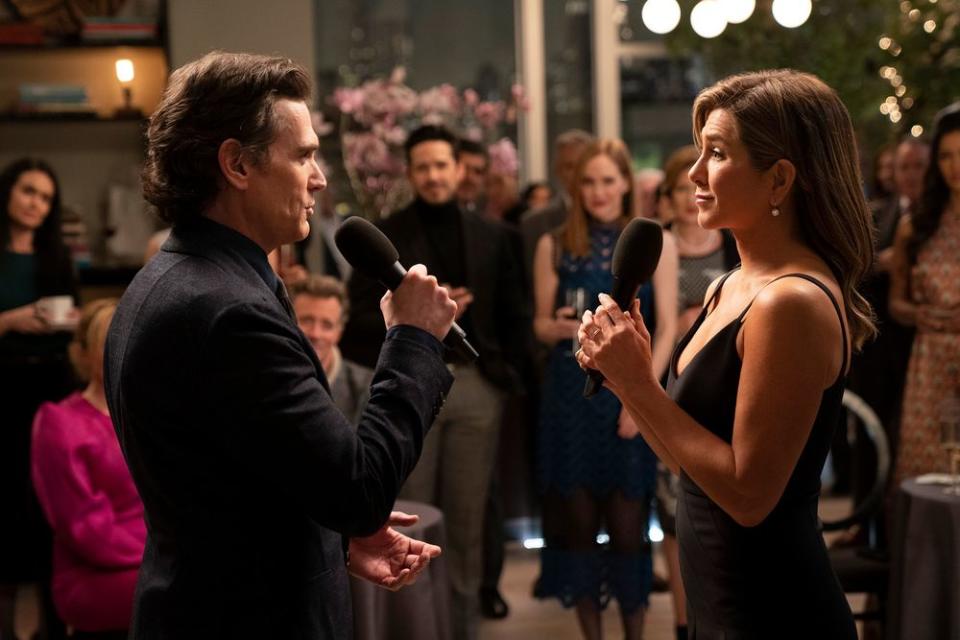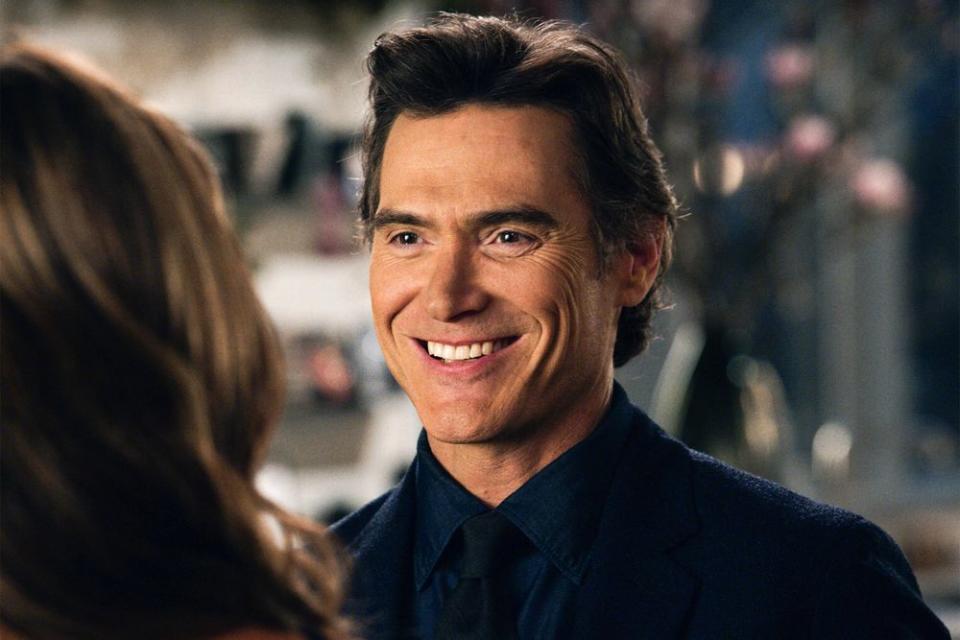The Morning Show star Billy Crudup on the 'whirlwind' of singing with Jennifer Aniston

A week after a guest appearance from Kelly Clarkson, The Morning Show just threw another musical performance at the audience, and this one was even wilder than the last.
In the Apple TV+ drama’s fifth episode, Alex (Jennifer Aniston), who is apparently a big fan of musicals, hosts a charity event at her home where people can get up and sing a song if they donate money to the cause. At one point, Cory Ellison (Billy Crudup), the chaos-loving president of UBA’s news division and one of Alex’s rivals, decides to hop up and sing “Not While I’m Around,” from Stephen Sondheim’s Sweeney Todd, in a bid to convince Alex that he means no harm. Not only that, but he invites her up on stage to sing with him because it is, after all, a duet. What ensues is wild, weird, and kind of fun, as you can see in the clip above.
EW hopped on the phone with Billy Crudup to discuss what it was like to shoot this out-of-nowhere moment, his mischievous performance on the show, and more.
ENTERTAINMENT WEEKLY: When I started watching this show, I wasn’t expecting Cory and Alex to sing a song from Sweeney Todd…
BILLY CRUDUP: Neither was I!
What was your first reaction when you found out you’d be singing Sondheim with Jennifer Aniston?
Well, I have two reactions that I can identify immediately. One is a thrill at every script that I got from [showrunner] Kerry Ehrin and her writing staff because the way that they were exploring Cory in this dynamic is endlessly appealing and entertaining to me, and very rewarding as an actor to get an opportunity to do all that, particularly in a show that is ambitious and aspiring to address as many different angles [of] this social reordering as possible.
Then my second reaction is, “They’ve never heard me sing. Oh f—.” I’m not a singer. I have to work harder than one would want to observe in order to make it sound just marginal. You can’t imagine the [fear]. I was calling my singing coach from graduate school, sending out every possible lifeline. Fortunately, I had a tremendous amount of help. I mean, there’s no question that amongst the music Kerry might have picked that would have been less intimidating to me musically speaking would be almost anything. But Sondheim, in the context of people behaving in complicated ways, seemed the perfect fit. As I’ve had with many of my experiences of reading the episodes that come, moments filled with total thrill and absolute terror.

There’s a moment where Yanko [Néstor Carbonell] describes the duet as “weird and fascinating.” Did it feel weird and fascinating while you guys shot it?
Well, preceding the actual moment when we’re shooting it is the rehearsal work and recording [of the song]. All it really was, was the kind of rigorous work, and we would rehearse together, and then we recorded in the studio together, which I have to say I count as a personal career high for me because we recorded at Capitol Records. When you’re walking down the hall to record your little moment for the TV show past pictures of Marvin Gaye, it sends a lasting thrill through your body.
Ultimately, I think the playing of it, while it’s extraordinary in the context, is really consistent with the way that Alex and Cory behave with each other through the first four episodes, which is they’re constantly testing one another out, curious about the others’ motivations, and wary of the other’s capabilities. The constant assessment and reassessment of where they stand with one another is one of the features of the relationship that makes it so interesting to me. And needless to say, that song and the lyrics give you every opportunity to explore that explicitly under the guise of this big pantomime. It’s a great opportunity for Cory and Alex to demonstrate publicly what has been going on privately, but in a way that’s also inexplicable. It leaves them both unexpectedly vulnerable.
[In] the actual filming of it, you’re so focused on doing your job at times like that because the stakes are so high, so it doesn’t feel like the kind of exuberant escapade that it might seem. There were some really complex interpersonal things that we had to make sure that we navigated, as well as the technical part of making sure to sing in sync so that they can use your voice live if possible. So all of it was kind of a whirlwind for me. I did find myself on the second day of filming, when they were [shooting] the other characters watching us, when we’re not on camera, I did find little moments of joy for myself in the fact that I was sitting there and getting a chance to sing Sondheim with Jen, which was a remarkable turn in my career. So that was a welcomed privilege for me.
You play Cory with this really fun chaotic energy. Is that something that came from the script, or did you decide to take the character in that direction as you were developing the performance?
Well, I feel like really all I’m doing in that performance is interpreting Kerry’s stuff. As we were developing at the beginning, I felt like Kerry was really willing for him to have his own guarded motivation. For people in positions of power, one of the interesting ways to study them is to observe that they don’t really have to tell anybody anything. They don’t have to explain themselves at all. So if they are in a situation where they’re concerned at the potential of a reorganization of power, the best thing they can do is not say anything and let other people try to interpret their behavior for them. Then they watch those people, much like wolves attacking the herd of bison: They’re in great shape while they’re all together and they’ve got their backs to one another and they’re facing the wolves with their horns. But as soon as the wolves scatter them and disrupt them, the most vulnerable ones are going to be easy pickings. So for somebody like Cory, waiting for the cracks to appear in the people around him is one of his, I think, primary tools.

In a recent Salon interview, you talked about the importance of connecting psychologically and emotionally with the journeys of the characters you play. How did you connect with Cory?
I’ve lived in New York since 1991, and there’s a portion of Cory and his own psychology that I think is uniquely attached to the capitalistic ambition. And if you do live in New York, there is no shortage of that sort of person from corner to corner. Whether it’s the person pivoting from selling umbrellas one day to sunscreen the next on the subway or the guys who are running Wall Street, the kind of hustler and angler that Cory is familiar to me in some broad stroke. And so all I’m doing is taking Kerry’s idea of him and interpreting it through the lens of what I’ve observed over the last 30 years or so.
Cory’s relationship with Bradley [Reese Witherspoon] is one of the most interesting things about the show, especially given the show’s exploration of appropriate and inappropriate workplace relationships. At times, it’s hard to tell what’s going on between them. Is that uncertainty intentional ?
I would like to say yes. I don’t want to elaborate too much because one of the things that’s interesting about that relationship, and at this point in time, is people are trying to figure it out. One of the things that the writers are doing as a creative and narrative arc is to allow people to interpret the behavior of everybody in the show in close proximity under this time of crisis to try to determine what their motivations are, what they’re really capable of, and whether or not the imagined future of equitable power distribution has all of the characteristics that we might expect, or if there are some characteristics that are unpredictable. I certainly think that relationship is one that I have been curious about where it’s going as well.
New episodes of The Morning Show drop Fridays on Apple TV+.
Related content:

